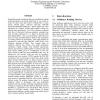Free Online Productivity Tools
i2Speak
i2Symbol
i2OCR
iTex2Img
iWeb2Print
iWeb2Shot
i2Type
iPdf2Split
iPdf2Merge
i2Bopomofo
i2Arabic
i2Style
i2Image
i2PDF
iLatex2Rtf
Sci2ools
CCR
1998
1998
Policy tree multicast routing: an extension to sparse mode source tree delivery
Bandwidth-sensitive multicast delivery controlled by routing criteria pertinent to the actual traffic flow is very costly in terms of router state and control overhead and it scales poorly towards larger, wide-area networks. PIM-SM (Protocol-independent Multicast - Sparse Mode) has been introduced as a simple, flexible and scalable concept for Internet-wide multicasting. Yet, PIM's efficiency potential (like that of alternative wide-area multicast concepts) can only be fully exploited if it is based on Reverse Path Forwarding (RPF), a low-cost mechanism, which however does not select prescribed delivery paths if link parameters or routing policies are asymmetric. This paper presents an extension to protocols like PIM-SM, called Policy Tree Multicast Routing (PTMR). This concept leads to multicast delivery trees which, even under asymmetric conditions, readily comply with imposed macroscopic policies and moreover enable support of shortest path and QoS criteria. PTMR gives no cons...
| Added | 21 Dec 2010 |
| Updated | 21 Dec 2010 |
| Type | Journal |
| Year | 1998 |
| Where | CCR |
| Authors | Horst Hodel |
Comments (0)

